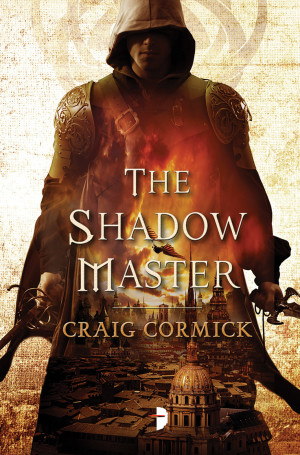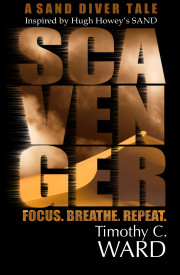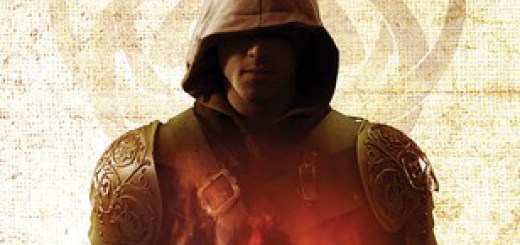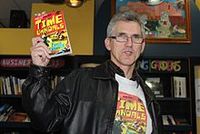 The Shadow Master by Craig Cormick (Angry Robot Books)
The Shadow Master by Craig Cormick (Angry Robot Books)
In a land riven with plague, inside the infamous Walled City, two families vie for control: the Medicis with their genius inventor Leonardo; the Lorraines with Galileo, the most brilliant alchemist of his generation.
And when two star-crossed lovers, one from either house, threaten the status quo, a third, shadowy power – one that forever seems a step ahead of all of the familial warring – plots and schemes, and bides its time, ready for the moment to attack…
Assassination; ancient, impossible machines; torture and infamy – just another typical day in paradise.
—————————————
Tim Ward: Your bio says you are an Australian science communicator and have worked on presenting new technologies to the public. What types of innovative technologies can we find in The Shadow Master?
I hear there’s a steampunk flavor to it. How might your creations differ from others you’ve read about in that genre?
Craig Cormick: A little bit of steam-punk – but only as far as cogs and machinery go – perhaps more accurate to say, ‘magic cog punk’ (does that exist yet? If not, you read it here first).
To help answer that question I should perhaps describe the book briefly: The Shadow Master is a kick-arse tale of alternative history, love and conflict, madness and magic, with sword fights and mad clerics and assassins and bombs and magical shape-changers and dark catacombs and tall towers and an army of plague people – with everything except a car chase. And through it all is this mysterious figure, the Shadow Master, who is manipulating everyone towards his own ends.
Sound interesting? I hope so.
The basic idea behind the book is that science works like magic! I came up with the idea for the book while walking around the Galileo Museum in Florence, where I’d been for a work conference on communicating science (awesome city to go to for a work trip!). Anyway, I’m wandering around the museum and looking at all these devices and inventions, like telescopes and cogged-machines for measuring time and so on – and I think, What if when you looked through Galileo’s telescope you actually transported across to the site you were looking at? And what if when you activated the chronometer, time stopped? And what if when you strapped on da Vinci’s winged harness you actually morphed into an eagle?
So the book is perhaps best thought of as an alternate history with fantastical and magical elements to it.
I read a review about The Shadow Master that essentially said this book fits in with the hard to define genre mashups that Angry Robot Books is popular for. Share with us what elements of genres you blended into this story. What was the hardest aspect of these combinations and what about their mashing up excites you?
Now I have a confession to make. I am ‘genre challenged’. By that I mean I tend to just read things that I like and that I think are good, and I range a bit the same in my writing, don’t get too distracted by what genre it might be. It could be romance or action or literary fiction or history or speculative fiction – but I just think of it as writing. Perhaps that makes doing a mashup a lot easier, when I just think of an idea and write it out as I think the story wants to be told, not needing to fit into genre parameters.
Having said that I do like to play around with ‘forms’ such as blending history and fantasy and so on, as I’ve done it this book, basing it quite closely on historical figures and actual events and leading families of Florence. I know some readers get a bit critical when you diverge from the expected genre path, but I find it makes for a much more interesting story.
How did this book help you grow as a writer? What advice would you give based on this experience?
I often tell students, write every book as if it’s the last book you’re ever going to write. But I got a two book deal from Angry Robot Books, for The Shadow Master and its sequel. So perhaps I have to modify that, in this instance, to: write every book as if it’s the second last book you’re ever going to write. And that’s actually quite a different thing – because rather than trying to complete the creation of a world and its narrative and characters, you have to be aware of setting things up for the sequel. It’s a bit like playing pool, when you haven’t yet had a few drinks, and you don’t just want to shoot for the ball you’re aiming for, but are needing to think of where you then want the ball to stop for the next shot.
What made you pick this time period and Romeo and Juliet type feel? How is it similar and different from other stories sharing these elements?
I chose the Renaissance as it seemed a time of monumental change, and the book is all about monumental change, or those points in time where events could go in different directions depending on the actions of different people. If the Renaissance had not happened, it is possible to argue that civilization as we know it might have been retarded by several hundred years. The Romeo and Juliet thing is interesting as I didn’t actually base the two lead characters on Romeo and Juliet, but rather the inspiration for them was the classical Italian novel the Betrothed (Il Promessi Sposi), written by Alessandro Manzoni in 1827. However it does show our intrinsic fascination with the Romeo and Juliet story of thwarted love, as it does keep emerging in literature over and over.
What relationship tensions do you think make your characters engaging for the reader?
The thing I think that most stands out is the mystery that surrounds the Shadow Master. For a reader, you are probably going to be asking, over and over, ‘So who exactly is this guy?’ And then get a bit frustrated when I never actually tell you. But that’s a part of what makes the book. It’s clear the Shadow Master knows more than he is letting on, and it is clear that he is manipulating events to get an outcome he wants, but who he is and why he is doing it is left unresolved.
I have a belief that the reader has to share in at least some of the work of the writer, and have an opportunity to create reasons and explanations for themselves. It means there is not necessarily ever one version of the book, as different readers will have different explanations for things, but I think that’s something really exciting.
You have a diverse catalog of books. What direction are you hoping to take your career and how are you setting yourself up for that? How is your relationship with Angry Robot Books helping?
That’s a very good question and one I’ve been pondering a bit, but have never been asked, so thanks for making my crystalise my thoughts on it. I do have a diverse range of books with my name on them, covering science and non-fiction, and short fiction and historical and so on – but I have to say I really enjoy the speculative fiction ‘genre’, as I have always had a tendency to include elements of the fantastical and alternative history into my work. For me it’s a very comfortable fit to be working with a publisher who is very happy to publish that type of work, as it can get push back from more literary publishers.
Angry Robot, unlike their name, have been very pleasant and nice robots to work with – and while I note from online comments that this first book is causing some readers a bit of confusion with where it goes at the end – book two will make it all apparent. I’ve set book two in a Venice-like city and am using the original Italian stories that Shakespeare took and developed into Othello, the Merchant of Venice and Romeo and Juliet in it.
You can check them out here: Luigi da Porto’s Giulietta e Romeo, (https://archive.org/details/giuliettaeromeo00clizgoog) Ser Giovanni’s Il Pecorone (the Dunce), (http://merchantofvenice.weebly.com/uploads/1/4/2/6/1426390/il_pecorone.pdf) and Giraldi Cinthio’s Hecatommithi (http://www.shakespeare-navigators.com/othello/Osource.html
It’s quite a fun book (at least for me writing it – and I hope readers find that too).
Thank you for answering my questions, Craig! After studying abroad in Sippy Downs, Queensland, Australia and their people have become dear to my heart. I wish you the best.
Sippy Downs! That would be the University of the Sunshine Coast, yes? Near the rather awkwardly named Dicky Beach. Very nice part of the world.
Read an excerpt of The Shadow Master:
Cormick’s creative writing has appeared in most of Australia’s literary journals including Southerly, Westerly, Island, Meanjin, The Phoenix Review, Overland, Scarp, 4W, Redoubt, Block, as well as in overseas publications including Silverfish New Writing (Malaysia) and Foreign Literature No 6 (China). He has previously been an editor of the radical arts magazine Blast, and his writing awards include the ACT Book of the Year Award in 1999 and the Queensland Premier’s Literary Award in 2006. As a science communicator he has represented the Australian Government at many international science forums including APEC and OECD conferences, presenting on issues relating to public concerns about new technologies.
—————————————————————————————————————————————————
 Timothy C. Ward
Timothy C. Ward
Executive Producer

Timothy C. Ward has been podcasting since 2010, first as AudioTim, and now with AISFP. His newest story, Scavenger: A Sand Diver Tale
, is available on Kindle and Smashwords for $.99. His novel in progress, Order After Dark, is a Post-apocalyptic Fantasy set in the rift between Iowa and the Abyss. Sign up to his author newsletter for updates on new releases.
Subscribe to Adventures in SciFi Publishing podcast on: iTunes | Stitcher Radio (Android users) | RSS | Website RSS | Newsletter (Subscribers are entered on giveaways)



















Speak Your Mind